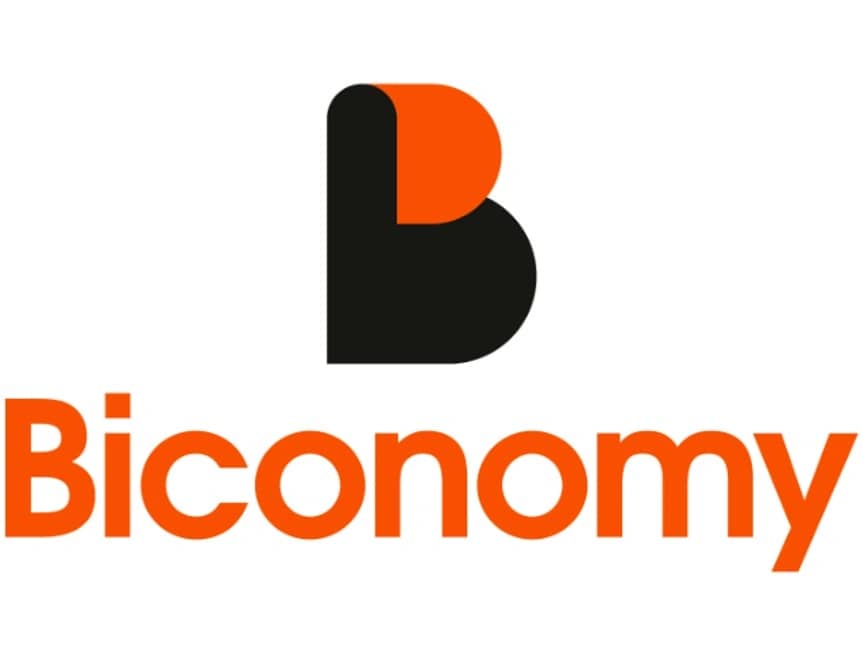위키 구독하기
Share wiki
Bookmark
Biconomy
0%
Biconomy
Biconomy는 Ethereum 블록체인 위에 구축된 멀티체인 릴레이어 네트워크입니다. 블록체인 운영에서 가스비 및 네트워크 전환과 같은 문제점을 해결하여 탈중앙화 애플리케이션(dApps)의 사용자 경험을 간소화하는 것을 목표로 합니다. [1]
개요
Biconomy는 2019년에 Sachin Bansal, Ahmed Al-Balaghi 및 Aniket Jindal이 설립했습니다. 이 플랫폼은 web3 및 암호화폐 사용자의 온보딩을 간소화하고 비용을 절감하는 데 중점을 둡니다. 여러 체인에서 dApp에 대한 가스 없는 거래 및 직관적인 사용자 온보딩과 같은 혁신적인 솔루션을 제공합니다. [2][3]
Biconomy는 메타 트랜잭션을 활용하여 최종 사용자를 대신하여 사용자 트랜잭션을 처리하여 전반적인 사용자 경험을 개선하려고 시도합니다. 플랫폼의 릴레이어 인프라 및 트랜잭션 네트워크는 암호화폐 트랜잭션에 대한 결제 게이트웨이 역할을 하여 사용자 경험을 간소화하고 블록체인 기술의 채택을 촉진합니다. [2][4]
운영을 용이하게 하기 위해 Biconomy는 유틸리티 및 거버넌스 토큰 역할을 하는 BICO라는 자체 토큰을 보유하고 있습니다. BICO는 네트워크의 유효성 검사자에게 지불하는 데 사용되며 사용자가 네트워크 개선을 제안하고 투표하여 거버넌스 프로세스에 참여할 수 있도록 합니다. 이는 유효성 검사자 및 트랜잭션 실행자에게 인센티브를 제공하여 Biconomy 네트워크 내에서 강력한 생태계를 만듭니다. [1][2]
Biconomy SDK
가스 없는 트랜잭션
Biconomy SDK의 가스 없는 트랜잭션을 통해 사용자는 가스 수수료를 위한 네이티브 토큰 없이도 분산형 애플리케이션(dApp)과 상호 작용할 수 있습니다. Paymaster 계약을 "가스 탱크"로 활용하여 사용자는 자금을 예치하고 dApp 계약을 화이트리스트에 등록하여 dApp 내에서 가스를 추상화할 수 있습니다. 이 메커니즘은 사용자 온보딩을 단순화하고 dApp을 사용하기 전에 암호화폐 토큰을 구매할 필요성을 없애줍니다. [5]
Biconomy의 가스 없는 트랜잭션 흐름을 통해 사용자는 트랜잭션을 시작하고 Biconomy SDK를 통해 서명을 제공합니다. 그런 다음 릴레이어(번들러)는 Entry Point 계약을 사용하여 트랜잭션을 온체인에 게시합니다. 이 계약은 서명을 확인하고 Paymaster를 사용하여 dApp의 예치금에서 가스 수수료를 회수합니다. 사전 배포된 BiconomyVerifyingPaymaster와 같은 Paymaster를 사용하면 dApp이 가스 수수료를 후원할 수 있으며, 사용하지 않은 자금은 필요할 때 인출할 수 있습니다. [5]
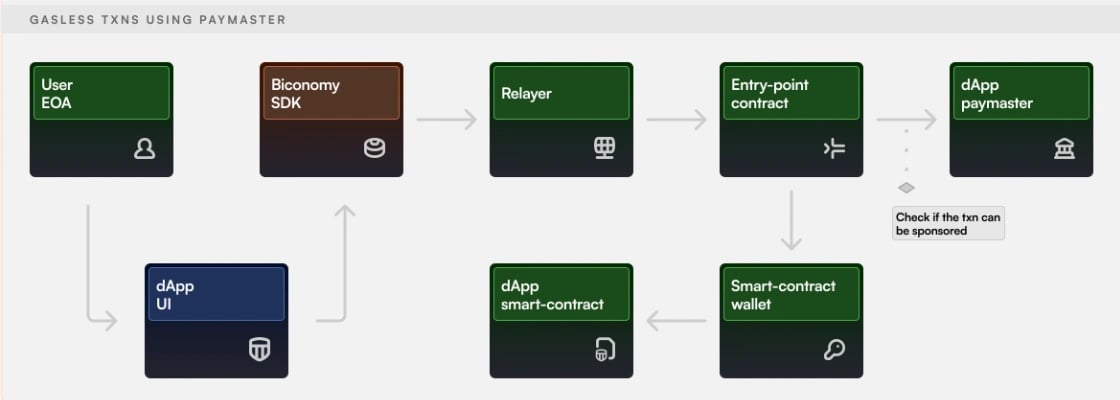
일괄 처리 트랜잭션
일괄 처리 트랜잭션은 스마트 계약 기반 계정 사용자가 단일 온체인 트랜잭션 내에서 여러 트랜잭션을 실행할 수 있는 편리한 솔루션을 제공합니다. 일괄 처리 트랜잭션을 사용하면 dApp의 가스 비용을 줄일 수 있으며 사용자의 시간과 노력을 절약할 수 있는 잠재력이 있습니다. 개발자는 일괄 처리 트랜잭션을 활용하여 복잡한 작업을 단순화하고 사용자가 여러 단계를 수행할 필요성을 없애고 dApp의 전반적인 유용성을 향상시킬 수 있습니다. 이 접근 방식은 사용자가 한 번의 클릭으로 여러 트랜잭션을 실행할 수 있는 보다 원활하고 친숙한 웹2와 유사한 경험을 제공하는 것을 목표로 합니다. [6]
개발자 측면에서 일괄 처리 트랜잭션은 기존 계약을 수정할 필요 없이 dApp에 쉽게 통합할 수 있습니다. 또한 일괄 처리 트랜잭션은 대량의 탈중앙화 금융(DeFi) 거래에서 광부 추출 가능 가치(MEV)와 관련된 위험을 완화하여 선행 매매 및 가치 추출 가능성을 줄이는 데 도움이 될 수 있습니다. [6]
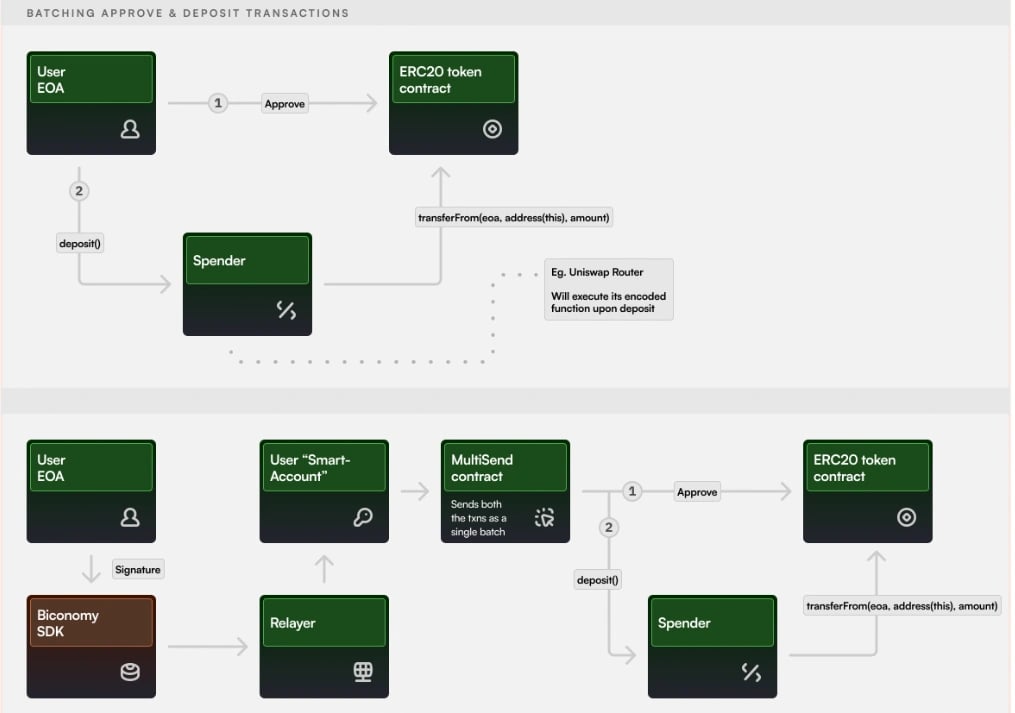
법정화폐 온-램프 및 오프-램프
Biconomy는 개발자 통합 툴킷인 Transak과 제휴하여 편리한 법정화폐 온-램프 및 오프-램프 솔루션을 제공합니다. 이 통합을 통해 사용자는 선호하는 애플리케이션이나 웹사이트 내에서 직접 암호화폐를 구매하거나 판매할 수 있어 프로세스를 간소화하고 자산 온/오프 램핑의 복잡성을 제거합니다. [7]
Transak의 법정화폐 온-램프를 통해 사용자는 원하는 법정화폐로 주문하고 결제 방법을 선택할 수 있습니다. 처음 사용하는 사용자는 간단한 KYC 프로세스가 필요합니다. 그런 다음 Transak은 법정화폐 결제를 안전하게 처리하고 선택한 암호화폐로 변환하여 사용자의 스마트 계약 지갑으로 전달하여 dApp 경험에 필요한 암호화폐에 즉시 액세스할 수 있도록 합니다. [7]
Transak의 오프-램프 솔루션을 통해 사용자는 암호화폐 보유 자산을 쉽게 청산할 수 있습니다. 일회성 KYC 프로세스를 완료한 후 사용자는 보유 자산을 판매하기로 결정할 때마다 스마트 계약 지갑에서 직접 암호화폐 결제를 시작할 수 있습니다. Transak은 암호화폐 결제의 원활한 조정을 처리하고 사용자가 선호하는 통화로 해당 법정화폐 금액을 사용자의 은행 계좌로 이체하여 신속하고 번거롭지 않은 경험을 보장합니다. [7]
소셜 로그인
Biconomy는 Web3Auth와의 파트너십을 통해 Biconomy SDK를 통해 Web3 애플리케이션에 소셜 로그인을 제공합니다. 전통적인 소셜 로그인과 Web3 인증을 통합함으로써 플랫폼은 간소화된 온보딩 프로세스를 제공합니다. 사용자는 암호화 키 쌍에 대한 제어권을 유지하여 안전한 액세스 및 소유권을 보장합니다. [8]
소셜 로그인을 통해 사용자는 Google, Facebook 또는 이메일과 같은 인기 있는 소셜 플랫폼을 사용하여 dApp에 로그인할 수 있습니다. 각 사용자에게는 Web3Auth에서 생성한 고유한 개인 키가 할당되어 지갑 팝업이나 컨텍스트 전환 없이 원활한 트랜잭션 서명이 가능합니다. 이메일이 동일하게 유지되는 한 다양한 소셜 계정에서 일관된 계정 경험을 제공합니다. [8]
Biconomy는 개인 키를 저장하지 않습니다. Web3Auth는 사용자가 다단계 계정과 유사하게 키를 처리하는 키 인프라를 활용합니다. 개인 키는 공유로 나뉘며, 장치 공유는 사용자 장치에 안전하게 저장되고, OAuth 로그인 공유는 노드 네트워크에 배포되며, 백업/2FA 공유는 복구 옵션 역할을 합니다. 사용자는 원래 개인 키에 액세스하고 트랜잭션에 서명하기 위해 세 개의 공유 중 최소 두 개의 소유권을 증명해야 하므로 보안이 강화됩니다. [8]
제품
Hyphen
Hyphen은 폴리곤, 이더리움 및 아발란체 간에 이더리움 및 USDC와 같은 스테이블코인을 원활하게 전송할 수 있는 솔루션을 제공합니다. 다른 브리지에 비해 더 빠른 거래 속도와 낮은 수수료를 목표로 합니다. Hyphen의 아키텍처는 예치 프로세스, 감시 타워 노드, 실행자 노드 및 재조정 스크립트를 포함합니다. 최근 Hyphen 2.0 출시로 무허가 유동성 공급, 자본 효율성을 위한 동적 수수료, 차익 거래 기회, 체인 및 자산 지원 증가와 같은 새로운 기능이 추가되었습니다. 이 아키텍처는 보안, 속도, 연결성, 자본 효율성 및 상태성을 우선시하도록 설계되어 강력하고 효율적인 크로스 체인 전송 솔루션을 제공합니다. [16]
Forward
Forward는 사용자가 ERC20 토큰으로 가스 수수료를 지불할 수 있도록 하여 가스 수수료에 ETH가 필요한 병목 현상에 대한 해결책을 제공합니다. Forward에서 제공하는 간단한 API를 통해 최종 사용자는 스테이블 코인 및 기타 ERC20 토큰을 사용하여 가스 수수료를 지불할 수 있으며, 온보딩 경험을 향상시키고 사용자의 ETH 투자를 보존하는 것을 목표로 합니다. ERC20 토큰으로 가스 결제를 가능하게 함으로써 Forward는 개발자가 DeFi 프로토콜, 지갑, dApp, 금융 애플리케이션 및 블록체인 게임과 같은 다양한 영역에서 사용자 경험을 향상시킬 수 있는 기회를 열어줍니다. Forward는 최적화 기술을 활용하여 완료된 트랜잭션을 보장하고 가스 사용량을 최적화하여 실패하거나 멈춘 트랜잭션을 제거하는 것을 목표로 합니다. Biconomy는 Forward를 활용하기 위한 혁신적인 아이디어를 적극적으로 모색하고 있으며 ERC20 토큰으로 가스 결제를 활용하는 새로운 사용 사례를 환영합니다. [17]
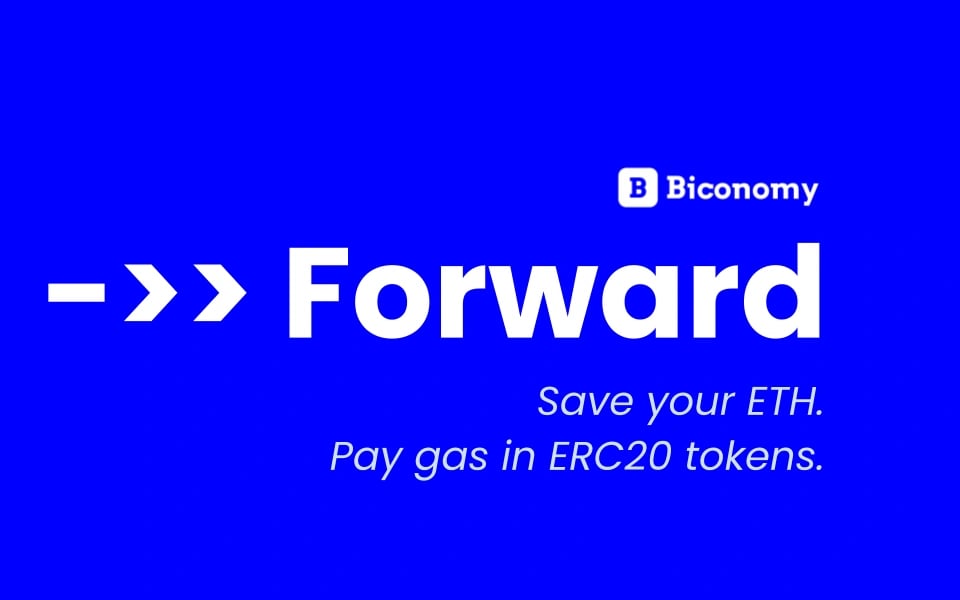
$BICO
BICO 토큰은 Biconomy 멀티체인 릴레이어 인프라의 네이티브 및 거버넌스 토큰 역할을 합니다. 네트워크 수수료로 사용되고, 네트워크 참여자들의 보안 및 유지보수를 장려하며, 네트워크 거버넌스에 참여하도록 함으로써 네트워크를 탈중앙화하는 데 중요한 역할을 합니다. [9]
유틸리티
네트워크 수수료
BICO는 Biconomy 블록체인의 주요 토큰으로 기능하며, 이는 지원되는 체인 전반에 걸쳐 Biconomy 네트워크의 모든 활동에 대한 정산 및 검증 계층으로 작동합니다. 노드 운영자는 체인에 정보를 추가할 때 BICO를 사용하여 거래 수수료를 지불해야 하며, 네트워크에 대한 기여도에 비례하여 BICO를 얻습니다. [9]
이해관계자 인센티브
노드 운영자 검증인과 실행자는 네트워크에 적극적으로 기여하기 위해 BICO를 스테이킹합니다. 그들은 기여도와 스테이킹 금액에 상응하는 BICO 보상을 받습니다. 부정 행위가 발생할 경우 네트워크는 스테이킹된 BICO를 줄일 권한을 가집니다. 검증인은 다른 체인의 관련 트랜잭션을 수신하고 Biconomy 체인에 기록하며, 실행자는 이러한 트랜잭션을 기반으로 작업을 실행합니다. [9][10] 위임자 BICO 토큰 보유자는 토큰을 스테이킹하여 네트워크 보안을 더욱 강화하고 스테이킹 금액에 비례하여 BICO를 얻습니다. [9][10] 유동성 공급자 최적의 기능을 보장하기 위해 프로토콜은 지원되는 모든 체인에서 다양한 토큰의 활성 유동성을 필요로 합니다. 유동성 공급자(LP)는 다양한 암호화 자산을 다양한 체인의 프로토콜 유동성 풀에 공급하여 이 유동성을 제공합니다. 사용자가 유동성 풀을 활용하면 소정의 수수료가 징수되어 LP에게 분배됩니다. 또한 LP는 주어진 유동성 풀에 대한 상대적 기여도에 비례하여 BICO를 얻습니다. [9][10]
거버넌스
BICO 보유자는 Biconomy 프로토콜 및 전체 네트워크에 영향을 미치는 결정에 대해 제안하고 투표할 권한을 가집니다. 이러한 결정에는 네트워크 코드 수정, 추가 서비스 도입 또는 재무 자금 할당에 대한 결정이 포함됩니다. 모든 BICO 보유자는 더 넓은 Biconomy 커뮤니티의 고려를 위해 제안서를 제출할 수 있습니다. 이러한 거버넌스 측면은 점진적인 분산화라는 Biconomy의 비전과 일치하며 커뮤니티 주도의 성장과 자립 가능성을 목표로 합니다. [9]
토큰 이코노미
토큰 분배
BICO 토큰의 총 공급량은 10억 개로 제한되며 다음과 같이 할당됩니다: [9]
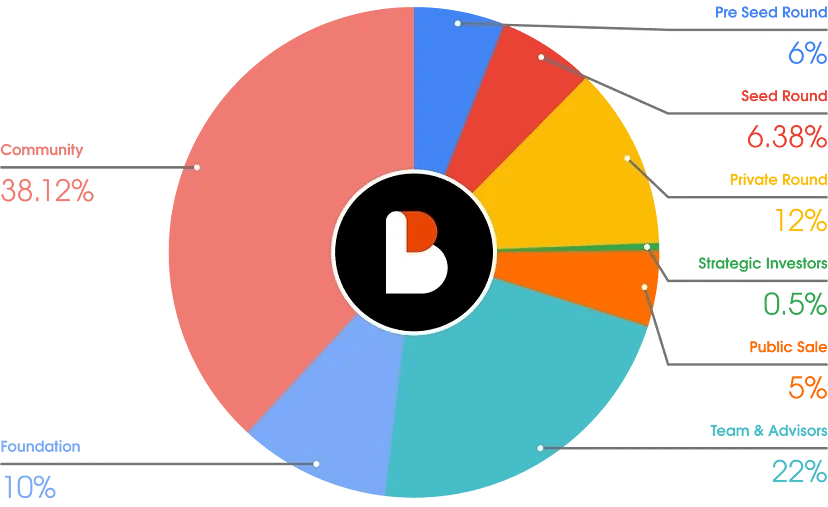
토큰 배포 일정
배포 일정은 투자자와 팀 간의 장기적인 협력을 보장하고 프로젝트의 성공에 대한 공동의 노력을 조성하도록 설계되었습니다. [9]
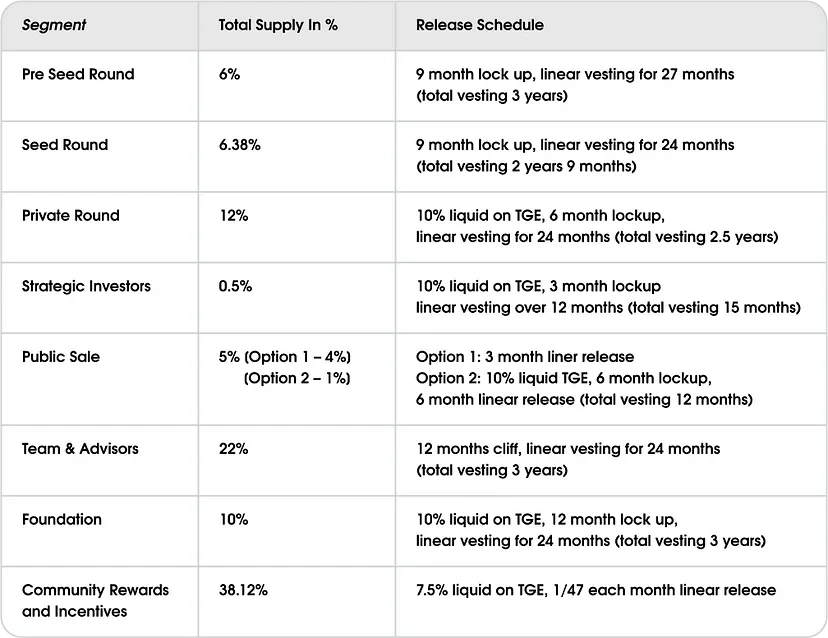
자금 조달
2020년 12월 31일, Biconomy는 유럽 벤처 캐피털 그룹인 Eden Block이 주도한 시드 펀딩에서 150만 달러를 모금했습니다. 이번 펀딩 라운드에는 Fenbushi Capital, Binance, DACM도 참여했습니다. 이 자금은 dApp과의 상호 작용 시 마찰을 줄여 사용자 경험을 향상시키는 데 사용될 예정입니다. Biconomy는 사용자가 블록체인 앱을 지불하고 사용하는 방식을 혁신하여 Web3 및 블록체인 프로젝트를 위한 간소화된 온보딩 및 거래 프로세스를 구상하는 것을 목표로 한다고 밝혔습니다.[11][14]
"사용자가 블록체인 애플리케이션을 지불하고 사용하는 방식은 완전히 바뀌어야 합니다. Netflix는 사용자가 비디오를 볼 때마다 수수료를 부과하지 않는데, 왜 dapps는 모든 상호 작용에 대해 사용자에게 가스 수수료를 부과해야 할까요?" - Ahmed Al-Balaghi, 공동 창립자 겸 CEO
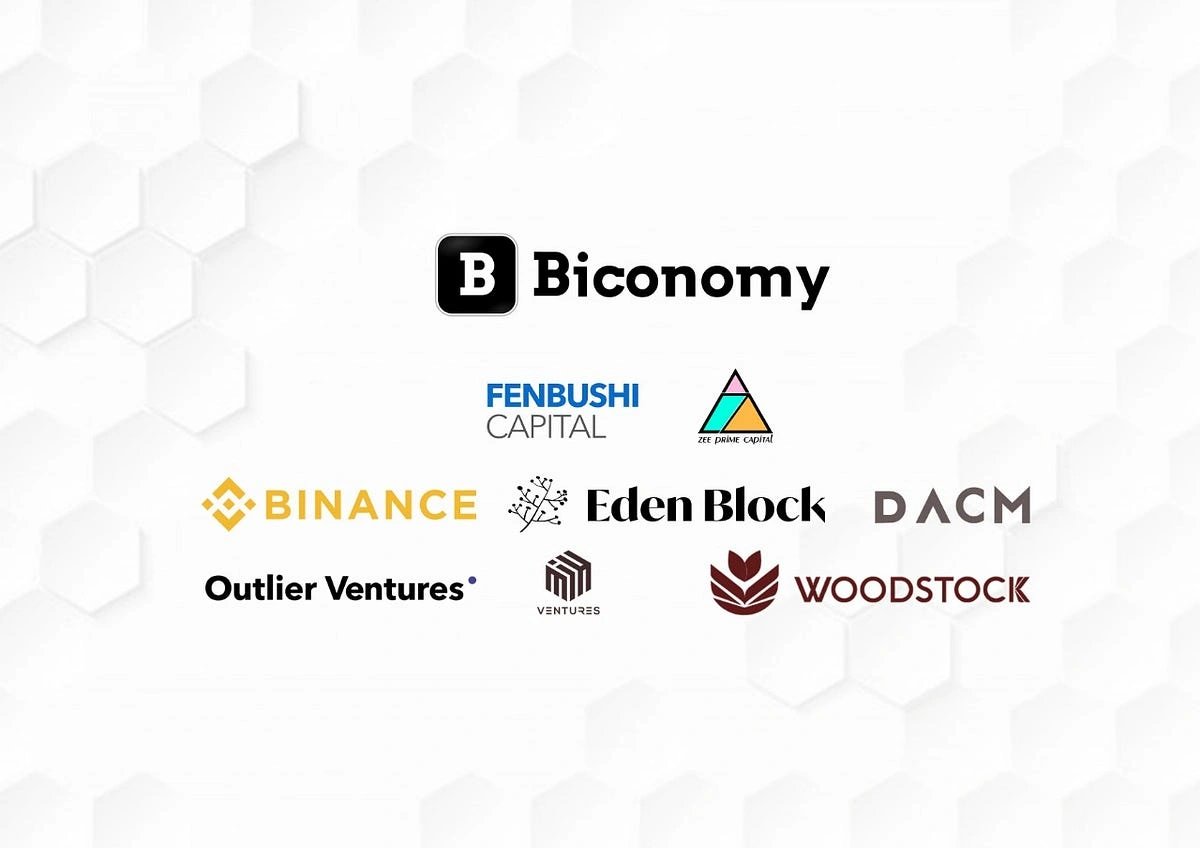
"모든 암호화폐 상호 작용은 복잡합니다. 구매 및 판매와 같은 간단한 작업이든 다양한 분산형 금융 계약 또는 애플리케이션을 통한 복잡한 상호 작용이든, 대부분의 사람들이 이해할 수 없기 때문에 주류 채택에 큰 걸림돌이 됩니다." - Ahmed Al-Balaghi, 공동 창립자 겸 CEO
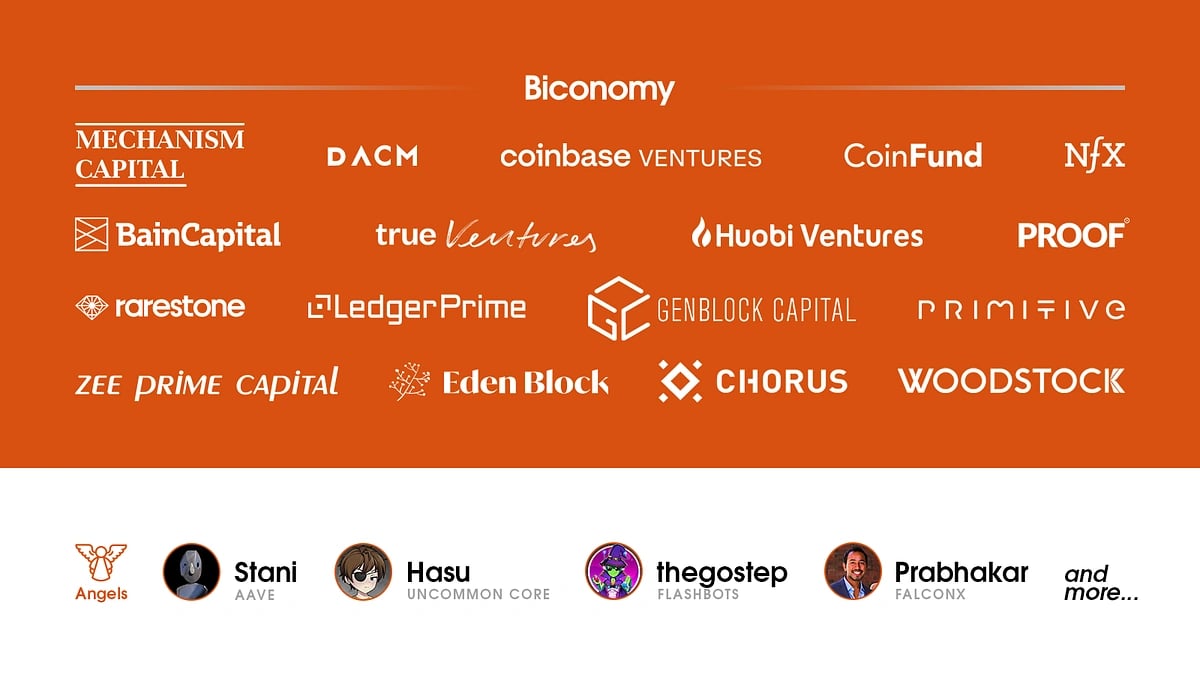
파트너십
- Artizen
- AntNetworX
- Bungee
- Carv
- Cere Network
- Conflux
- intrXn
- Li.Fi
- Minke
- Particle Network
투자자
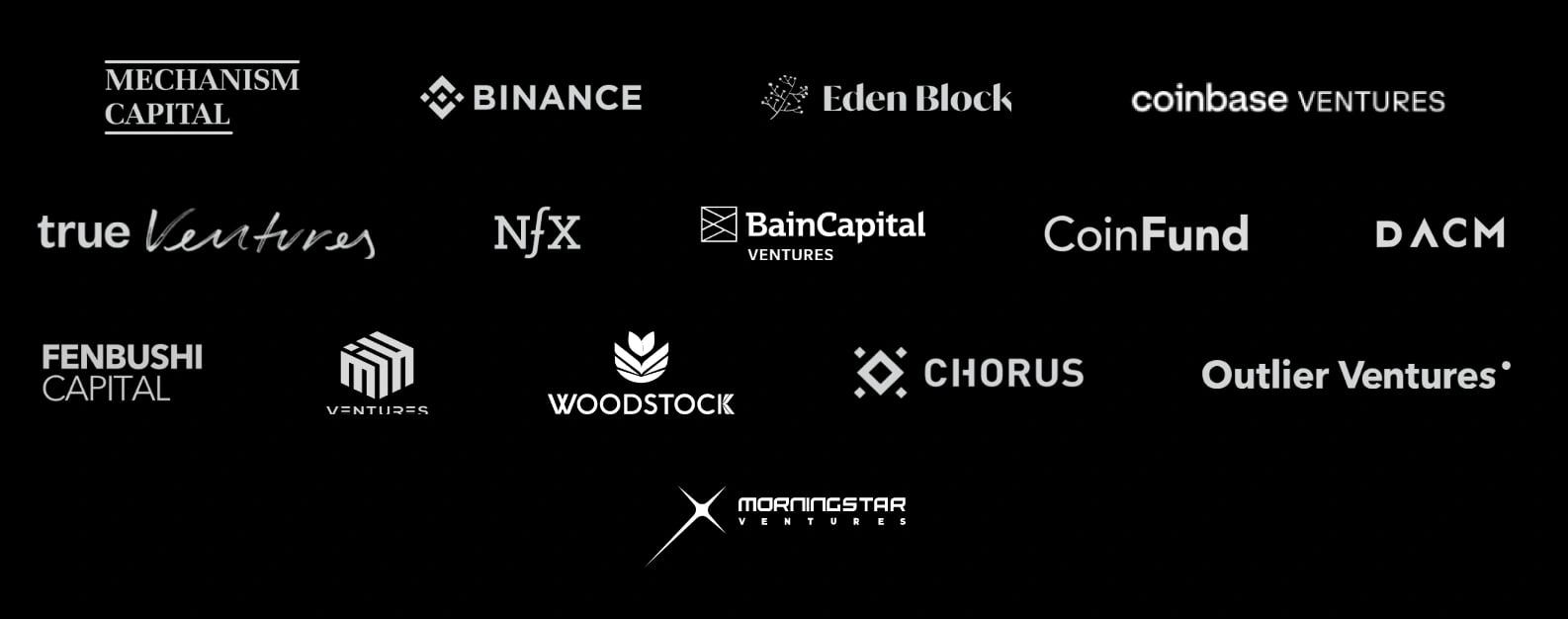
팀
- Ahmed Al-Balaghi: CEO, 공동 창립자
- Aniket Jindal: COO, 공동 창립자
- Sachin Tomar: CTO, 공동 창립자
자문위원
- Sandeep Nailwal: 자문위원 & COO, Polygon
- Yoav Weiss: 자문위원 & 보안, Ethereum 재단
잘못된 내용이 있나요?
